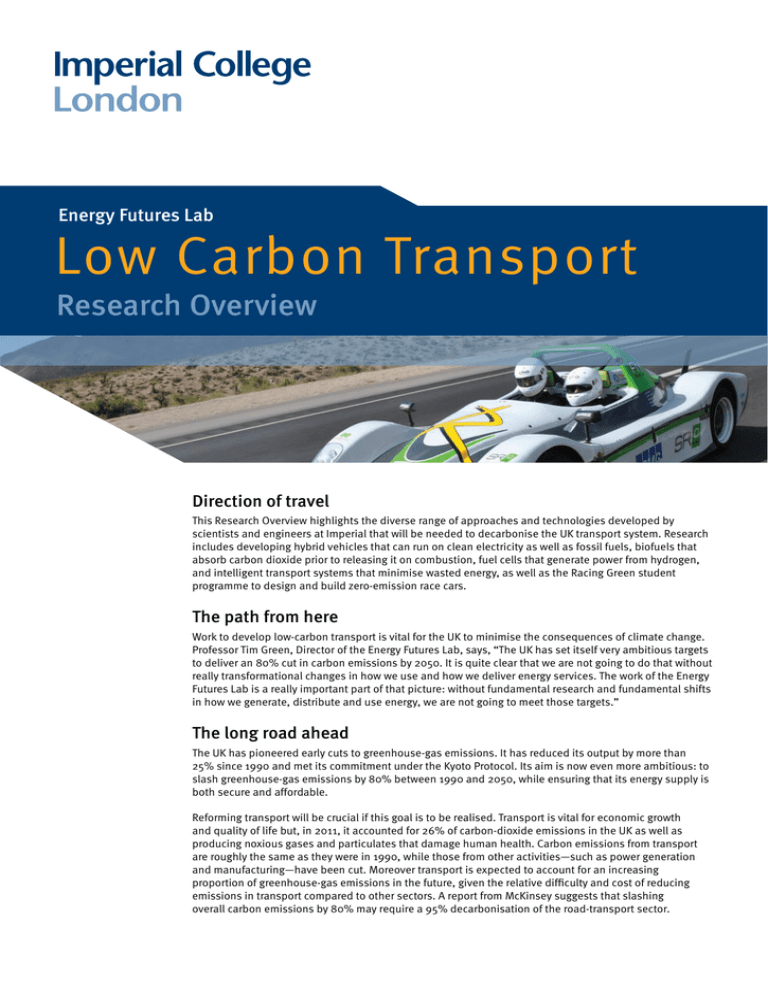Low Carbon Transport - Workspace
advertisement

Energy Futures Lab Low Carbon Transport Research Overview Direction of travel This Research Overview highlights the diverse range of approaches and technologies developed by scientists and engineers at Imperial that will be needed to decarbonise the UK transport system. Research includes developing hybrid vehicles that can run on clean electricity as well as fossil fuels, biofuels that absorb carbon dioxide prior to releasing it on combustion, fuel cells that generate power from hydrogen, and intelligent transport systems that minimise wasted energy, as well as the Racing Green student programme to design and build zero-emission race cars. The path from here Work to develop low-carbon transport is vital for the UK to minimise the consequences of climate change. Professor Tim Green, Director of the Energy Futures Lab, says, “The UK has set itself very ambitious targets to deliver an 80% cut in carbon emissions by 2050. It is quite clear that we are not going to do that without really transformational changes in how we use and how we deliver energy services. The work of the Energy Futures Lab is a really important part of that picture: without fundamental research and fundamental shifts in how we generate, distribute and use energy, we are not going to meet those targets.” The long road ahead The UK has pioneered early cuts to greenhouse-gas emissions. It has reduced its output by more than 25% since 1990 and met its commitment under the Kyoto Protocol. Its aim is now even more ambitious: to slash greenhouse-gas emissions by 80% between 1990 and 2050, while ensuring that its energy supply is both secure and affordable. Reforming transport will be crucial if this goal is to be realised. Transport is vital for economic growth and quality of life but, in 2011, it accounted for 26% of carbon-dioxide emissions in the UK as well as producing noxious gases and particulates that damage human health. Carbon emissions from transport are roughly the same as they were in 1990, while those from other activities—such as power generation and manufacturing—have been cut. Moreover transport is expected to account for an increasing proportion of greenhouse-gas emissions in the future, given the relative difficulty and cost of reducing emissions in transport compared to other sectors. A report from McKinsey suggests that slashing overall carbon emissions by 80% may require a 95% decarbonisation of the road-transport sector. The human element Winning the hearts and minds of people who are growing increasingly sceptical about climate change will also be crucial, particularly as energy bills rise. Transport offers environmentally conscious consumers many more choices—and much more visible ones—than, say, domestic heating. “Transport is a bellwether for the whole energy debate,” says Professor Nigel Brandon, Director of the Sustainable Gas Institute. “You replace your car more often than your domestic boiler and it sits on the road or your drive outside your home, telling people who you are.” As well as studying fundamental science, EPSRC Fellow Dr Gregory Offer conducts research that includes analysing competing transport options to assess the technical, economic and social desirability of change. He says that it is never safe to assume that people will alter their behaviour to accommodate a promising technology, nor to think that, because people won’t necessarily change their behaviour, a technology that allows them to carry on as before will triumph. Instead a portfolio of technologies that have proven successful in particular niches tend to compete for drivers and passengers in the mass market. (Top) Turbochargers like those developed by Dr Ricardo Martinez-Botas can recover waste energy in a car to improve its efficiency and performance. (Left) Dr Greg Offer is studying the electrochemistry of batteries to improve their effectiveness and longevity. (Right) Researchers in Imperial’s GroDome experiment with the best way to cultivate willow plants for bioethanol extraction. Indeed, observes Professor John Polak, Profesor of Transport Demand, battery-only electric cars have so far proved unpopular with individual drivers because they have a limited range and are expensive to buy, albeit cheap to run. But companies that buy fleets of vehicles, such as supermarket chains that deliver groceries, have the wherewithal to make the initial investment and so reap savings overall. Researchers are developing new ways to use large fleets of electric vehicles to maximum effect by, for example, identifying the optimal use of expensive but fast-to-charge vehicles and cheaper but slower-charging models. Professor Polak also believes that the parking business will be transformed by the growth in electric mobility. He is working with industry to develop the technology needed to integrate parking, charging and energy grid balancing in a sustainable and cost-effective manner. The technological transition It will take decades to replace all the vehicles powered by internal combustion engines with those powered by low-carbon alternatives, so initial efforts to cut the carbon emissions caused by cars are focussed on improving the fuel efficiency of existing models. Ricardo Martinez-Botas, Professor of Turbomachinery, is developing ways to boost the performance of small internal combustion engines that will deliver an improvement in fuel economy of up to 35%, because of fewer losses through friction and heat transfer. Such engines will retain the power and feel of the bigger engines available today. With colleagues Professor Martinez-Botas has patented a system that uses exhaust gases to propel a high-performance turbine that is coupled to a high-speed electrical generator, thus making use of energy that would otherwise go to waste. He says that these new engines will be commonplace on the roads within the next few years. “In the short- to medium-term, this technology is affordable, acceptable and it is not completely novel, so it is comfortable to manufacturers and buyers,” he says. “This is crucial research because it offers a very significant short-term gain.” Further down the road Streamlined and smart Because they require only small changes in behaviour and are relatively cheap, hybrid vehicles that combine petrol engines with electric power supplied by batteries will be adopted sooner than other technologies, predicts Dr Offer. He thinks that plug-in hybrid electric vehicles will eventually be as disruptive to the automotive market as flat-screen displays were to the selling of cathode-ray tube televisions. Alas for engineers, the batteries that help to power them are still not fully understood. So researchers at Imperial have built a new device that enables them to simulate the hot and bumpy physical conditions that batteries experience when in use in cars. This enables them to test how a battery performs when it is at the centre of a battery pack and when it is at the edge, so they can predict how batteries will operate when they are joined together. Other work includes helping industry to identify why certain components fail when they do—even though other similar components keep performing well. No matter how future vehicles are powered, transport systems could be made smarter. Professor Polak of the Centre for Transport Studies is developing new methods to predict incidents and congestion in transport networks that would enable managers to deal better with them. He thinks that greater communication and co-operation between individual vehicles and the wider transport network could help cut energy use and emissions, and he is developing techniques to enable this through improved co-ordination between individual vehicles’ engine management systems, traffic signal control and vehicle navigation. Green shoots Switching to biofuels could be an easy option for drivers reluctant to move away from fossil fuels, who like to take just minutes to fill up at fuel stations dotted around the country. Biofuels can be made from crops including sugarcane and maize for bioethanol and oil-seed rape and soybeans for biodiesel, but they could also push up food prices without necessarily cutting carbon-dioxide emissions. By-products and wastes such as animal fats, used cooking oil and rubbish otherwise destined for landfill or incineration might be better candidates for the production of biofuels, particularly for applications where refuelling or recharging is tricky, such as aviation. Researchers at Imperial are thus concentrating on developing biofuels for long-haul flights and trucking. Future fuels Fuel cells combine hydrogen with oxygen from the air to produce electricity and water vapour. A vehicle powered by such a fuel cell produces no carbon emissions directly but, because hydrogen is today mainly produced from natural gas, fuel-cell cars running on it have only slightly lower carbon emissions than conventional internal-combustion engines. For this reason, research at Imperial is focussed on the production of hydrogen from renewable resources, which includes the Artificial Leaf programme to cost-effectively harness solar energy to produce hydrogen from water. Researchers at Imperial are leading programmes to improve the performance and lifetime of a range of fuel-cell technologies, while also considering the wider implications of the technology. For example, staff at the Imperial Centre for Energy Policy and Technology study the interaction between the technical characteristics of fuel cells and their economic and environmental costs; their colleagues in the Centre for Process Systems Engineering help identify and evaluate how a hydrogen refuelling infrastructure might fit into the wider energy system. Racing Green In 2006 students from Imperial were invited to participate in Formula Student—an international competition to design, build and race a zero-emission fuel-cell go-kart. Imperial Racing Green was formed in 2007 and participated in the first race held in Rotterdam in 2008. The team came third with the most reliable vehicle on the track. Hundreds of students from across multiple engineering disciplines at Imperial have since taken part, developing and showcasing their skills to potential employers that seek to develop the next generation of low-emission vehicles. Students now race their vehicles at Silverstone in Formula Student, which have included a fuel-cell battery hybrid that was awarded the ‘most innovative design in engineering’ prize in 2009, a battery electric vehicle which came fifth in class in 2011 and a biofuel vehicle in 2012. Students are developing a novel series hybrid based upon patented technology for 2013. In 2010 a group of 11 Imperial Racing Green graduates set up their own project ‘Racing Green Endurance’ to design a battery electric car and drive it the 26,000-kilometre length of the Pan-American Highway from Alaska to Argentina, a journey that took over four months and which demonstrated that electric cars can be used to range far and wide and at speed through challenging terrain, not only for zipping around city centres. Energy Futures Lab Research Overviews explore the key issues that must be addressed if we are to develop more secure and sustainable energy supplies, and explain how research at Imperial College London paves the way to meeting these challenges. Our staff and students conduct multidisciplinary energy research to cut carbon emissions. With strong links to industry, they develop an integrated view of energy supply, demand and distribution that takes into account technological, environmental, economic and security considerations. Further articles in the Energy Futures Lab Research Overview series: contact • Sustainable Power • Clean Fossil Fuels • Energy Infrastructure • Policy and Innovation To find out more about the Energy Futures Lab, or to speak to us about carrying out research, funding us or collaborating with our researchers, please contact: Linnea Luuppala Energy Futures Lab Administrator Tel: +44 (0)20 7594 5865 E: l.luuppala@imperial.ac.uk Become a member of Energy Futures Lab to receive regular updates and invitations to events: www.imperial.ac.uk/energyfutureslab/about/ membership www.imperial.ac.uk/energyfutureslab



